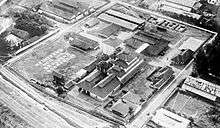Colonial architecture in Surabaya



Colonial architecture in Surabaya (Dutch: Soerabaja) includes the legacy of neoclassical architecture and Dutch architecture built during the Dutch East Indies era. The old city in Surabaya is a tourist attraction but faces problems with the deterioration of older buildings. It includes Dutch architecture, has an Arab quarter and areas exhibiting Chinese influence.[1] Jembatan Merah is an area known for its Dutch architecture.[1]
Cosman Citroen designed a city hall in 1916 and planned the area of Ketabang. Museum Bank Indonesia, Surabaya is located in the former De Javasche Bank building. The House of Sampoerna i s a museum devoted to the history of clove cigarette (kretek) manufacturing in Indonesia and is housed in a Dutch colonial building (originally an orphanage) dating to 1864.[1][2]
Gallery
-

Bijeenkomsthuis (meeting house)
-

Entrance portal of "De ingangspoort" (Perseverance), Royal Factory Steam and other machines in the year 1857 by F.J.H. Baijer
-

Harbor office in Surabaya and memorial on the occasion of the visit of Governor General Fock (September, 1922)
-

City garden (late 19th century)
-

Garden in Surabaya
-

"Komediegebouw" Surabaya
-

Heineken Brewery in Surabaya
-

Sociëteit Concordia (Concordia Society)
-

Goebang train station (Gubeng Train Station)
-

Post and Telegraph office
-

Resident's house in Surabaya
-

Pasar Besar in the background
-

Resident's house along the Ketabang River (Ketabang) in Surabaya (late 19th century)
-

Grimm & Co. "cake palace" at Pasar Besar
-

Goebang (now Gubeng district)
-

Postcard of sluice
-

Fountain and water carriers
-

Governor General Fock visiting a school
-

Hotel Embong Malang
-

Piccolo Club Toendjoengan (signage on building says Hetwenkwe (sp?) Huis (1938)
-

Kurkdjian photo studio (O. Kurkdjian & Co.)
-

International trade office in Willemsplein
See also
References
- 1 2 3 Lonely Planet Indonesia Ryan Ver Berkmoes, Celeste Brash, Muhammad Cohen, Mark Elliott, Guyan Mitra, John Noble, Adam Skolnick, Iain Stewart, and Steve Waters Lonely Planet, Sep 1, 2010
- ↑ "House of Sampoerna website".
Further reading
- The heritage and impact of Dutch architecture and civil engineering in Surabaya and Malang Petra University Surabaya 2003
